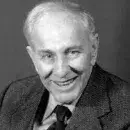Humankind’s Origins
This project brought together experts in the biological sciences, physical sciences, and social sciences to examine the evolution and origin of human biology, behavior, and society.
Directed by Morris Goodman (Wayne State University), this study brought together junior and senior scholars in molecular biology, genomics, geology, cognitive sciences, philosophy and ethics, paleontology, anthropology, and other fields to probe the origins of human biology, behavior, and society from diverse perspectives. The Academy hosted a conference to promote the study and public understanding of the holistic process that shaped basic features of our species, Homo sapiens. Participants identified key issues and areas of research collaboration.
Participants focused first on how comparative primate genomic data can help decipher the genetic basis of being human. The group also examined the impact of the earth's changing physical and biological environment on human evolution and language development. Project participants looked at how system-level methodology can illuminate the interactions between the molecular, genetic, and cultural-social levels of organization.
This conference followed up an earlier symposium, titled “Humankind’s Evolutionary Roots: Our Place in Nature,” held in October 1998 at the Field Museum in Chicago.
Selected results of the five-year study were published in 2002 in an Academy Occasional Paper, Probing Human Origins. The report suggests that complex interactions among genetic, environmental, and cultural factors have influenced the evolution of humans.
